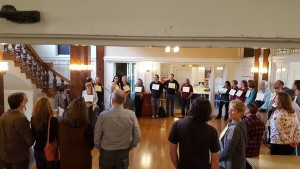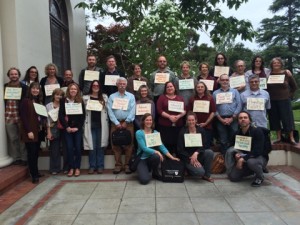Compensation for 2016
Salary
Over the past decade, full-time salaries have fallen significantly in comparison with salaries in other Districts across the state. Much of the relative drop actually happened prior to the recession, when we were setting aside $2 million in FTES reserves to plan for the recession. We’ve never made it back up and are now very low in the state, particularly when we look at column 6 of the salary schedule where most faculty members are placed.
 CCFT has worked hard over the past couple of years to demonstrate to the District that our salaries are low even when the college contributions towards benefits are accounted for. Moreover, our net ending balance remains above average while our faculty salaries are not. And, faculty salaries have shrunk as a percentage of the college budget over the past decade. Collectively, we would like the District to PRIORITIZE faulty salaries.
CCFT has worked hard over the past couple of years to demonstrate to the District that our salaries are low even when the college contributions towards benefits are accounted for. Moreover, our net ending balance remains above average while our faculty salaries are not. And, faculty salaries have shrunk as a percentage of the college budget over the past decade. Collectively, we would like the District to PRIORITIZE faulty salaries.
CCFT kicked off the semester with a petition campaign to get all faculty informed and on board. About a third of all faculty signed the petition. At the March Governing Board meeting six faculty members presented various perspectives on why increases are needed: Dustin McKenzie, Michael Mangin, Barbara Schultz Perez, Karl Ewald, Arturo Cantu, and Brian Legakis (see the piece from Brian Legakis in this issue LINK).
At the most recent Board meeting, we wanted to send a strong message to the Board regarding taking faculty seriously. So we organized a group of 29 faculty members to greet Board members as they entered closed session to hear our proposal. Note that we did not want a bigger action at that meeting, as they had not even heard the proposal. We’re confident that many more faculty would have/will attend if and when needed. The next Governing Board meeting that we would possibly have a showing of faculty at is September 12, both at 6pm in the Sesnon House.
After the April 11 Board meeting we heard back from the District negotiating team that the Board requested more time, so they can see if the bond passes and obtain more info about the state budget. While the CCFT team really wanted to finish this semester, we have agreed to extend the current Contract until the end of September or middle of October of 2016. We will keep faculty apprised of new developments.
Benefits
Benefits increases have come in relatively low for next year. The Benefits Committee is currently reviewing our current plans and other options. We should have a final determination of plans in May. Final details of the District contribution towards the benefits package plans will be part of our compensation discussion with the District. Current Benefits Committee Reps for CCFT are Conrad Scott-Curtis, Jennifer Lee, and Katie Dowling.
Enhanced Non-Credit
Faculty members in various disciplines have been meeting as part of the AB 86 consortium and developing enhanced non-credit courses. For fall 2016, classes have been approved in CABT, ESL, Library, and Math.
Given that these courses are generally all in-class hours with no grading or homework, the District felt that payment for such courses should be compensated at an hourly rate. The District wanted to start the pilot program at one hourly rate. CCFT believed that we could start using an hourly rate, but that the salary schedule should parallel what we have now.
As a compromise we agreed to the following hourly schedule for the next two years:
| BA or specific Min Requirements | MA/MS | MA/MS + 60 units (BA + 90) | |
| Step 1-6 | 36 | 39 | 42 |
| Step 7-11 | 42 | 45 | 48 |
| Step 12+ | 48 | 51 | 54 |
The program will then be reevaluated and compensation adjusted accordingly. For more details about our agreement on noncredit see Side Letter of Agreement 2015-16.4.
Background:
In 2013 the state legislature passed a bill (AB 86) to rebuild and improve adult education in the state in the wake of such programs being decimated by the recession. While non-credit courses have traditionally been taught through the K-12 system in our county, the bill encouraged regional consortium to develop countywide plans for rebuilding adult education. In parallel with these efforts, the community college budget realized an improvement in funding for certain categories of non-credit adult education courses which is called enhanced noncredit. Traditional noncredit included nine categories: elementary and secondary basic skills, English as a second language, immigrant education, adults with disabilities, short-term career technical education, parenting, older adult programs, health and safety, and home economics. Enhanced non-credit courses include only the first five of theses categories.
Evaluation
Various subcommittees have been working over the past couple of years to revise and improve our Evaluation process (Article 17). The current subcommittee will soon be prepared to bring proposed changes to the negotiations teams for review and approval (after consultation with Faculty Senate and review by the CCFT Council).
Participants on various versions of the committee include Eric Hoffman, Vicki Fabbri, Skye Gentile, Conrad Scott-Curtis, Brian Legakis, Maya Bendotoff, and Debora Bone along with administrators Isabel O’Connor, Wanda Garner, and James Weckler.
Department Chair (DC, previously PC) Matrix
A subcommittee of the negotiations team has been working this year to simplify (if possible) and improve the DC matrix. In brief, the subcommittee is looking at parts of the matrix that are straightforward (such as number of PT and FT faculty, etc.) and aspects of the matrix that are complex (accreditation, large budgets, overseeing equipment and facilities, etc.). The current direction of the committee is to keep the simple factors and then have a committee review and set the complex factors of the matrix. CCFT reps on the current subcommittee: Karl Ewald, Dan Rothwell, and Conrad Scott-Curtis; District reps: Wanda Garner, Isabel O’Connor, and Terrence Willet.
Ancillary Activities: Extension of Pilot Program
Since spring of 2014 CCFT and the District have had various versions of a pilot program for paid ancillary activities for adjunct faculty. Discussion will soon take place as how to move forward for next year.

